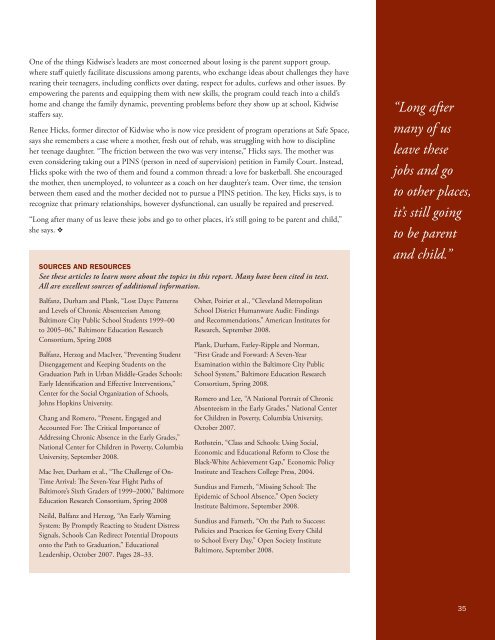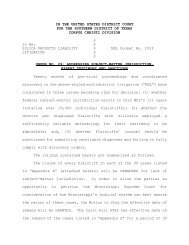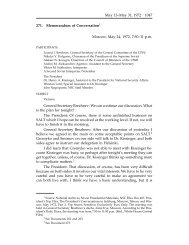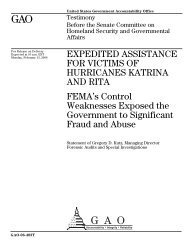Strengthening Schools by Strengthening Families
Strengthening Schools by Strengthening Families
Strengthening Schools by Strengthening Families
Create successful ePaper yourself
Turn your PDF publications into a flip-book with our unique Google optimized e-Paper software.
One of the things Kidwise’s leaders are most concerned about losing is the parent support group,<br />
where staff quietly facilitate discussions among parents, who exchange ideas about challenges they have<br />
rearing their teenagers, including conflicts over dating, respect for adults, curfews and other issues. By<br />
empowering the parents and equipping them with new skills, the program could reach into a child’s<br />
home and change the family dynamic, preventing problems before they show up at school, Kidwise<br />
staffers say.<br />
Renee Hicks, former director of Kidwise who is now vice president of program operations at Safe Space,<br />
says she remembers a case where a mother, fresh out of rehab, was struggling with how to discipline<br />
her teenage daughter. “The friction between the two was very intense,” Hicks says. The mother was<br />
even considering taking out a PINS (person in need of supervision) petition in Family Court. Instead,<br />
Hicks spoke with the two of them and found a common thread: a love for basketball. She encouraged<br />
the mother, then unemployed, to volunteer as a coach on her daughter’s team. Over time, the tension<br />
between them eased and the mother decided not to pursue a PINS petition. The key, Hicks says, is to<br />
recognize that primary relationships, however dysfunctional, can usually be repaired and preserved.<br />
“Long after many of us leave these jobs and go to other places, it’s still going to be parent and child,”<br />
she says. ❖<br />
sourCes and resourCes<br />
See these articles to learn more about the topics in this report. Many have been cited in text.<br />
All are excellent sources of additional information.<br />
Balfanz, Durham and Plank, “Lost Days: Patterns<br />
and Levels of Chronic Absenteeism Among<br />
Baltimore City Public School Students 1999–00<br />
to 2005–06,” Baltimore Education Research<br />
Consortium, Spring 2008<br />
Balfanz, Herzog and MacIver, “Preventing Student<br />
Disengagement and Keeping Students on the<br />
Graduation Path in Urban Middle-Grades <strong>Schools</strong>:<br />
Early Identification and Effective Interventions,”<br />
Center for the Social Organization of <strong>Schools</strong>,<br />
Johns Hopkins University.<br />
Chang and Romero, “Present, Engaged and<br />
Accounted For: The Critical Importance of<br />
Addressing Chronic Absence in the Early Grades,”<br />
National Center for Children in Poverty, Columbia<br />
University, September 2008.<br />
Mac Iver, Durham et al., “The Challenge of On-<br />
Time Arrival: The Seven-Year Flight Paths of<br />
Baltimore’s Sixth Graders of 1999–2000,” Baltimore<br />
Education Research Consortium, Spring 2008<br />
Neild, Balfanz and Herzog, “An Early Warning<br />
System: By Promptly Reacting to Student Distress<br />
Signals, <strong>Schools</strong> Can Redirect Potential Dropouts<br />
onto the Path to Graduation,” Educational<br />
Leadership, October 2007. Pages 28–33.<br />
Osher, Poirier et al., “Cleveland Metropolitan<br />
School District Humanware Audit: Findings<br />
and Recommendations,” American Institutes for<br />
Research, September 2008.<br />
Plank, Durham, Farley-Ripple and Norman,<br />
“First Grade and Forward: A Seven-Year<br />
Examination within the Baltimore City Public<br />
School System,” Baltimore Education Research<br />
Consortium, Spring 2008.<br />
Romero and Lee, “A National Portrait of Chronic<br />
Absenteeism in the Early Grades,” National Center<br />
for Children in Poverty, Columbia University,<br />
October 2007.<br />
Rothstein, “Class and <strong>Schools</strong>: Using Social,<br />
Economic and Educational Reform to Close the<br />
Black-White Achievement Gap,” Economic Policy<br />
Institute and Teachers College Press, 2004.<br />
Sundius and Farneth, “Missing School: The<br />
Epidemic of School Absence,” Open Society<br />
Institute Baltimore, September 2008.<br />
Sundius and Farneth, “On the Path to Success:<br />
Policies and Practices for Getting Every Child<br />
to School Every Day,” Open Society Institute<br />
Baltimore, September 2008.<br />
“Long after<br />
many of us<br />
leave these<br />
jobs and go<br />
to other places,<br />
it’s still going<br />
to be parent<br />
and child.”<br />
35

















